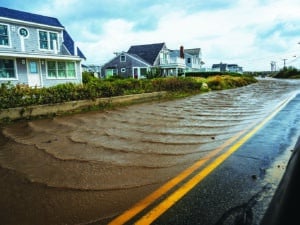
Houses in Falmouth look out on a road being flooded by a “bomb cyclone” storm in 2019. Seaside homes face increasing risks from storm surges and sea level rise as climate change continues.
As congressional Democrats speed ahead this week in pursuit of President Joe Biden’s $3.5 trillion plan for social and environmental spending, including climate change mitigation and adaptation money, a Democratic senator vital to the bill’s fate says the cost will need to be slashed to $1 trillion to $1.5 trillion to win his support.
Sen. Joe Manchin, D-West Virginia, also cautioned there was “no way” Congress will meet the late September goal from House Speaker Nancy Pelosi, D-California, for passage given his current wide differences with liberal Democrats on how much to spend and how to pay for it.
“I cannot support $3.5 trillion,” Manchin said Sunday, citing in particular his opposition to a proposed increase in the corporate tax rate from 21 percent to 28 percent and vast new social spending. “We should be looking at everything, and we’re not. We don’t have the need to rush into this and get it done within one week because there’s some deadline we’re meeting, or someone’s going to fall through the cracks.”
Democrats have no votes to spare if they want to enact Biden’s massive “Build Back Better” agenda, with the Senate split 50-50 and Vice President Kamala Harris the tiebreaker if there is no Republican support. Democratic congressional leaders have set a target of Wednesday for committees to have the bill drafted.
Pressed repeatedly about a price tag he could support, Manchin said, “It’s going to be $1, $1.5 (trillion).” He suggested the range was based on a modest rise in the corporate tax rate to 25 percent, a figure he believes will keep the U.S. globally competitive.
“The numbers that they’re wanting to pay for and the tax changes they want to make, is that competitive?” Manchin asked. “I believe there’s some changes made that does not keep us competitive.”
But Sen. Bernie Sanders, the Vermont independent who chairs the Senate Budget Committee and is helping craft the measure, noted that he and other members of the liberal flank in Congress had initially urged an even more robust package of $6 trillion.
“I don’t think it’s acceptable to the president, to the American people or to the overwhelming majority of the people in the Democratic caucus,” Sanders said. He added: “I believe we’re going to all sit down and work together and come up with a $3.5 trillion reconciliation bill which deals with the enormously unmet needs of working families.”
The current blueprint proposes billions for rebuilding infrastructure, tackling climate change and expanding or introducing a range of services, from free prekindergarten to dental, vision and hearing aid care for older people.
Manchin voted last month to approve a budget resolution that set the figure, though he and Sen. Kyrsten Sinema, D-Ariz., have expressed reservations about the topline amount. All of it would be paid for with taxes on corporations and the wealthy.
Congressional committees have been working hard this month on slices of the 10-year proposal in a bid to meet this week’s timeline from Pelosi and Senate Majority Leader Chuck Schumer, D-N.Y., to have the bill drafted. Pelosi is seeking a House vote by Oct. 1, near the Sept. 27 timeline for voting on a slimmer infrastructure plan favored by moderate lawmakers.
Manchin, who in an op-ed earlier this month urged a “strategic pause” on the legislation to reconsider the cost, described the timing as unrealistic. He has urged Congress to act first on the $1 trillion bipartisan infrastructure bill already passed by the Senate. But liberal Democrats have threatened to withhold their support until the $3.5 trillion spending bill is passed alongside it.
Neither side in their remarks on Sunday news programs revealed how they hoped to quickly bridge the divide among Democrats.
“There’s no way we can get this done by the 27th, if we do our job,” Manchin said. “There’s so much differences that we have here and so much — there’s so much apart from us where we are. … I’m working with people. I’m willing to talk to people. It makes no sense at all.”
Manchin spoke on CNN’s “State of the Union,” NBC’s “Meet the Press” and ABC’s “This Week.” Sanders was on CNN and ABC.






